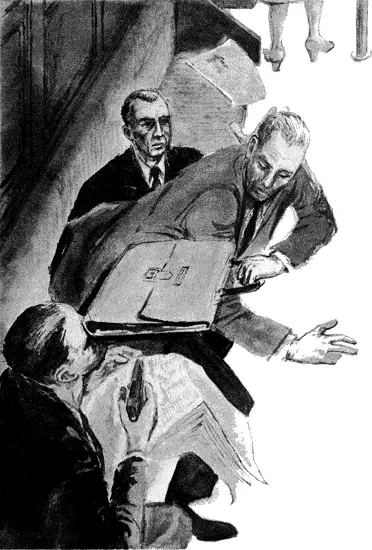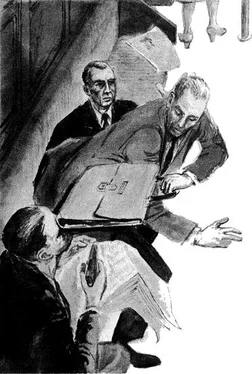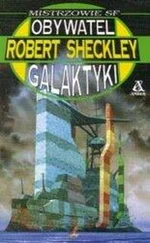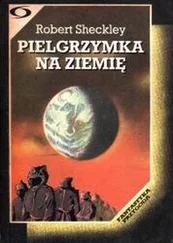Robert Sheckley - Forever
Здесь есть возможность читать онлайн «Robert Sheckley - Forever» весь текст электронной книги совершенно бесплатно (целиком полную версию без сокращений). В некоторых случаях можно слушать аудио, скачать через торрент в формате fb2 и присутствует краткое содержание. Жанр: Фантастика и фэнтези, на английском языке. Описание произведения, (предисловие) а так же отзывы посетителей доступны на портале библиотеки ЛибКат.
- Название:Forever
- Автор:
- Жанр:
- Год:неизвестен
- ISBN:нет данных
- Рейтинг книги:5 / 5. Голосов: 1
-
Избранное:Добавить в избранное
- Отзывы:
-
Ваша оценка:
- 100
- 1
- 2
- 3
- 4
- 5
Forever: краткое содержание, описание и аннотация
Предлагаем к чтению аннотацию, описание, краткое содержание или предисловие (зависит от того, что написал сам автор книги «Forever»). Если вы не нашли необходимую информацию о книге — напишите в комментариях, мы постараемся отыскать её.
Forever — читать онлайн бесплатно полную книгу (весь текст) целиком
Ниже представлен текст книги, разбитый по страницам. Система сохранения места последней прочитанной страницы, позволяет с удобством читать онлайн бесплатно книгу «Forever», без необходимости каждый раз заново искать на чём Вы остановились. Поставьте закладку, и сможете в любой момент перейти на страницу, на которой закончили чтение.
Интервал:
Закладка:
FOREVER
By NED LANG
Illustrated by DICK FRANCIS
With so much at stake, Charles Dennison should not have been careless. An inventor cannot afford carelessness, particularly when his invention is extremely valuable and obviously patentable. There are too many grasping hands ready to seize what belongs to someone else, too many men who feast upon the creativity of the innocent.
A touch of paranoia would have served Dennison well; but he was lacking in that vital characteristic of inventors. And he didn't even realize the full extent of his carelessness until a bullet, fired from a silenced weapon, chipped a granite wall not three inches from his head.
Then he knew. But by then it was too late.
Charles Dennison had been left a more than adequate income by his father. He had gone to Harvard, served a hitch in the Navy, then continued his education at M.I.T. Since the age of thirty-two, he had been engaged in private research, working in his own small laboratory in Riverdale, New York. Plant biology was his field. He published several noteworthy papers, and sold a new insecticide to a development corporation. The royalties helped him to expand his facilities.
Dennison enjoyed working alone. It suited his temperament, which was austere but not unfriendly. Two or three times a year, he would come to New York, see some plays and movies, and do a little serious drinking. He would then return gratefully to his seclusion. He was a bachelor and seemed destined to remain that way.
Not long after his fortieth birthday, Dennison stumbled across an intriguing clue which led him into a different branch of biology. He pursued his clue, developed it, extended it slowly into a hypothesis. After three more years, a lucky accident put the final proofs into his hands.
He had invented a most effective longevity drug. It was not proof against violence; aside from that, however, it could fairly be called an immortality serum.
Now was the time for caution. But years of seclusion had made Dennison unwary of people and their motives. He was more or less heedless of the world around him; it never occurred to him that the world was not equally heedless of him.
He thought only about his serum. It was valuable and patentable. But was it the sort of thing that should be revealed? Was the world ready for an immortality drug?
He had never enjoyed speculation of this sort. But since the atom bomb, many scientists had been forced to look at the ethics of their profession. Dennison looked at his and decided that immortality was inevitable.
Mankind had, throughout its existence, poked and probed into the recesses of nature, trying to figure out how things worked. If one man didn't discover fire, or the use of the lever, or gunpowder, or the atom bomb, or immortality, another would. Man willed to know all nature's secrets, and there was no way of keeping them hidden.
Armed with this bleak but comforting philosophy, Dennison packed his formulas and proofs into a briefcase, slipped a two-ounce bottle of the product into a jacket pocket, and left his Riverdale laboratory. It was already evening. He planned to spend the night in a good midtown hotel, see a movie, and proceed to the Patent Office in Washington the following day.
On the subway, Dennison was absorbed in a newspaper. He was barely conscious of the men sitting on either side of him. He became aware of them only when the man on his right poked him firmly in the ribs.
Dennison glanced over and saw the snub nose of a small automatic, concealed from the rest of the car by a newspaper, resting against his side.
"What is this?" Dennison asked.
"Hand it over," the man said.
Dennison was stunned. How could anyone have known about his discovery? And how could they dare try to rob him in a public subway car?
Then he realized that they were probably just after his money.
"I don't have much on me," Dennison said hoarsely, reaching for his wallet.
The man on his left leaned over and slapped the briefcase. "Not money," he said. "The immortality stuff."
In some unaccountable fashion, they knew. What if he refused to give up his briefcase? Would they dare fire the automatic in the subway? It was a very small caliber weapon. Its noise might not even be heard above the subway's roar. And probably they felt justified in taking the risk for a prize as great as the one Dennison carried.
He looked at them quickly. They were mild-looking men, quietly, almost somberly dressed. Something about their clothing jogged Dennison's memory unpleasantly, but he didn't have time to place the recollection. The automatic was digging painfully into his ribs.
The subway was coming to a station. Dennison glanced at the man on his left and caught the glint of light on a tiny hypodermic.
Many inventors, involved only in their own thoughts, are slow of reaction. But Dennison had been a gunnery officer in the Navy and had seen his share of action. He was damned if he was going to give up his invention so easily.
He jumped from his seat and the hypo passed through the sleeve of his coat, just missing his arm. He swung the briefcase at the man with the automatic, catching him across the forehead with the metal edge. As the doors opened, he ran past a popeyed subway guard, up the stairs and into the street.
The two men followed, one of them streaming blood from his forehead. Dennison ran, looking wildly around for a policeman.
The men behind him were screaming, "Stop, thief! Police! Police! Stop that man!"
Apparently they were also prepared to face the police and to claim the briefcase and bottle as their own. Ridiculous! Yet the complete and indignant confidence in their shrill voices unnerved Dennison. He hated a scene.
Still, a policeman would be best. The briefcase was filled with proof of who he was. Even his name was initialed on the outside of the briefcase. One glance would tell anyone ...
He caught a flash of metal from his briefcase, and, still running, looked at it. He was shocked to see a metal plate fixed to the cowhide, over the place where his initials had been. The man on his left must have done that when he slapped the briefcase.
Dennison dug at the plate with his fingertips, but it would not come off.
It read, Property of Edward James Flaherty, Smithfield Institute .
Perhaps a policeman wouldn't be so much help, after all.
But the problem was academic, for Dennison saw no policeman along the crowded Bronx street. People stood aside as he ran past, staring open-mouthed, offering neither assistance nor interference. But the men behind him were still screaming, "Stop the thief! Stop the thief!"
The entire long block was alerted. The people, like some sluggish beast goaded reluctantly into action, began to make tentative movements toward Dennison, impelled by the outraged cries of his pursuers.
Unless he balanced the scales of public opinion, some do-gooder was going to interfere soon. Dennison conquered his shyness and pride, and called out, "Help me! They're trying to rob me! Stop them!"
But his voice lacked the moral indignation, the absolute conviction of his two shrill-voiced pursuers. A burly young man stepped forward to block Dennison's way, but at the last moment a woman pulled him back.
"Don't get into trouble, Charley."
"Why don't someone call a cop?"
"Yeah, where are the cops?"
"Over at a big fire on 178th Street, I hear."
"We oughta stop that guy."
"I'm willing if you're willing."
Dennison's way was suddenly blocked by four grinning youths, teen-agers in black motorcycle jackets and boots, excited by the chance for a little action, delighted at the opportunity to hit someone in the name of law and order.

Интервал:
Закладка:
Похожие книги на «Forever»
Представляем Вашему вниманию похожие книги на «Forever» списком для выбора. Мы отобрали схожую по названию и смыслу литературу в надежде предоставить читателям больше вариантов отыскать новые, интересные, ещё непрочитанные произведения.
Обсуждение, отзывы о книге «Forever» и просто собственные мнения читателей. Оставьте ваши комментарии, напишите, что Вы думаете о произведении, его смысле или главных героях. Укажите что конкретно понравилось, а что нет, и почему Вы так считаете.







